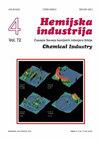Preparation and properties of hydrogen peroxide oxidized starch for industrial use
IF 0.8
4区 工程技术
Q4 ENGINEERING, CHEMICAL
引用次数: 5
Abstract
Oxidized starch, an additive used in paper manufacturing and products for construction industry, is usually produced using harmful oxidant, such as hypochlorites or periodates. In this study, a simple and efficient eco-friendly laboratory and industrial procedures for starch oxidation were developed. The procedure involves application of small amounts of more environmentally friendly oxidant, hydrogen peroxide, a novel special metal complex catalyst such as copper(II) citrate and copper(II) ricinoleate and biobased plasticizers. Optimization procedure, with respect to the quantity of hydrogen peroxide and temperature in the presence of iron(II) sulphate catalyst, was performed by using the response surface methodology. Comparative analysis of the use of the other catalysts that is copper(II) sulphate, copper(II) citrate and copper(II) ricinoleate, indicated copper(II) citrate as the catalyst of choice. Improvement of starch is achieved using three plasticizers: ricinoleic acid (RA), diisopropyl tartarate, as well as epoxidized soybean, linseed and sunflower oils. The effects of hydrogen peroxide and catalyst concentrations, as well as the reaction temperature in the presence of naturally based plasticizers on the physicochemical, thermal and morphological properties of oxidized starch are presented. According to the results obtained in initial experiments, the optimal industrial process is based on the use of copper(II) citrate (0.1 %) as a catalyst and RA (3 %) as a plasticizer.工业用过氧化氢氧化淀粉的制备及性能
氧化淀粉是一种用于造纸和建筑业产品的添加剂,通常使用有害的氧化剂生产,如次氯酸盐或高碘酸盐。在本研究中,开发了一种简单高效的淀粉氧化环保实验室和工业程序。该程序包括应用少量更环保的氧化剂过氧化氢、一种新型的特殊金属络合物催化剂,如柠檬酸铜(II)和蓖麻油酸铜(Ⅱ)以及生物基增塑剂。在硫酸铁(II)催化剂存在的情况下,关于过氧化氢的量和温度的优化程序通过使用响应面方法进行。对硫酸铜(II)、柠檬酸铜(II。淀粉的改良使用三种增塑剂:蓖麻油酸(RA)、酒石酸二异丙酯以及环氧化大豆油、亚麻籽和葵花籽油。介绍了过氧化氢和催化剂浓度,以及在天然增塑剂存在下的反应温度对氧化淀粉的物理化学、热学和形态性质的影响。根据初始实验中获得的结果,最佳工业工艺是基于使用柠檬酸铜(II)(0.1%)作为催化剂和RA(3%)作为增塑剂。
本文章由计算机程序翻译,如有差异,请以英文原文为准。
求助全文
约1分钟内获得全文
求助全文
来源期刊

Hemijska Industrija
工程技术-工程:化工
CiteScore
1.60
自引率
11.10%
发文量
12
审稿时长
6-12 weeks
期刊介绍:
The Journal Hemijska industrija (abbreviation Hem. Ind.) is publishing papers in the field of Chemical Engineering (Transport phenomena; Process Modeling, Simulation and Optimization; Thermodynamics; Separation Processes; Reactor Engineering; Electrochemical Engineering; Petrochemical Engineering), Biochemical Engineering (Bioreactors; Protein Engineering; Kinetics of Bioprocesses), Engineering of Materials (Polymers; Metal materials; Non-metal materials; Biomaterials), Environmental Engineeringand Applied Chemistry. The journal is published bimonthly by the Association of Chemical Engineers of Serbia (a member of EFCE - European Federation of Chemical Engineering). In addition to professional articles of importance to industry, scientific research papers are published, not only from our country but from all over the world. It also contains topics such as business news, science and technology news, information on new apparatus and equipment, and articles on environmental protection.
 求助内容:
求助内容: 应助结果提醒方式:
应助结果提醒方式:


